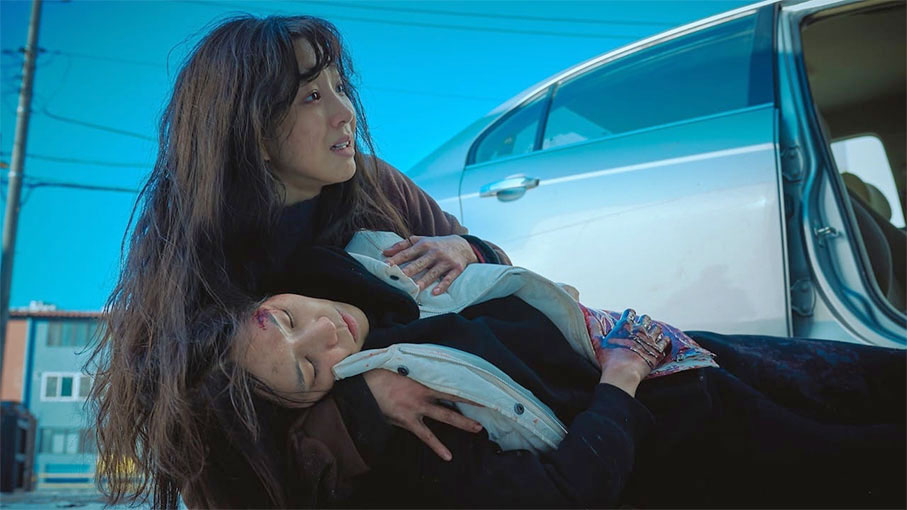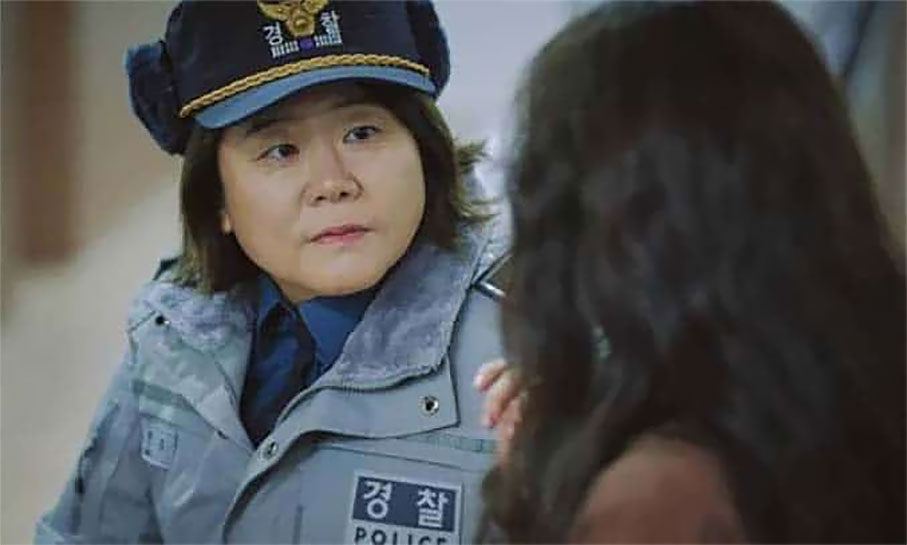|
It’s unusual to watch a film that makes good on its title in its opening scene, and were it not for a couple of small but rather significant points, The Woman in the White Car would seem to do just that. After a montage of static shots of an unidentified but snowy and decrepit-looking location, a car is observed driving down a mountain road and rolling up at a small hospital in the small Korean town of Seolwon. Here, a woman whose name we later learn is Do-kyung (Ryeowon Jung) clambers out of the vehicle, her bare and bruised feet instantly signalling that all is not well. Is she the woman in the white car? That, it would seem, is yet to be confirmed, as this car is not white and she’s not the only female occupant. As she pulls her unconscious and seriously wounded companion – whom she refers to as “Unnie” (big sister) – from the car, she calls out desperately for help, but the hospital receptionist has stepped away from the front desk to make herself a drink. When she returns, she rushes outside to assist, and her cup falls to the ground and smashes in slow motion in what feels as laced with symbolism as that falling goldfish bowl in The Omen.
Called to investigate are a young local police patrolman – one whose name I never caught – and his older female partner Kim Hyun-ju (Lee Jeong-eun). As they drive to the hospital, they are informed by the dispatcher that the two women are indeed sisters, and while the younger Do-kyung is stable despite having taken a beating, the older Mi-kyung is in a critical condition, and is now being treated for fractured hands, badly bruised legs, and a stab wound to her abdomen. When the officers reach the hospital, Do-kyung is sitting in the reception area in a state of shock, with a number of cuts and bruises on her face, hands and feet. As soon as Hyun-ju sees her, she experiences a flashback that suggests this is not the first time a young woman has found herself sitting in that very seat in a similar state. Despite her trauma, Do-kyung is refusing treatment for her own injuries and instead keeps looking in the direction of the intensive care unit where surgeons are attempting to save her sister’s life. The sympathetic Hyun-ju sits and gently tries to calm her concerns. “She’ll be all right,” she tells her. “Take it from someone who’s been through it. You can trust me.” Quite what she means by that will not become clear for some time.

Hyun-ju’s kindly reassurance convinces Do-kyung to let the medical staff dress her wounds, and when the officer approaches her again, she proves to be a little calmer and more communicative, able to confirm that the incident that brought her here occurred at home. When asked if she and her sister were the only ones there at the time, she ominously reveals that someone else was present. In a flashback that visually differentiates itself from the central narrative though its colour grading and smooth switch of aspect ratio, Do-kyung is at home when her sister shows up at the door with a man who introduces himself as Mi-kung’s fiancé. What unfolds is a brief but deeply disturbing tale of abuse and physical violence that culminates in a narrow escape for the two women. The story, however, has one small but contradictory hole that the wily Hyun-ju picks up on but elects not to press given Do-kyung’s still fragile state. “It’s not Unnie’s fault!” Do-kyung states as her agitation increases.
With little chance of getting more out of this still disorientated woman for the moment, Hyun-ju reunites with her partner and suggests that they go pick up this abusive fiancé, but her partner has some unexpected news. It turns out that Do-kyung does indeed have a sister named Mi-kyung, but she’s not the seriously injured woman she arrived with. Indeed, the real Mi-kyung used to work at the hospital and is well-known to her former colleagues. “So who’s the woman in surgery?” asks Hyun-ju, to which her partner responds, “No-one knows.” This proves to be the first of many perfectly timed and deftly executed twists in a slow-burn thriller that is peppered with surprises and unreliable narrators. As a result, just when you think you have a handle on things, a new piece of information or a fresh testimony throws all that you thought you knew into doubt. Or maybe not. Each time a new revelation came along to contradict the established facts, I found myself wondering if it really disproved what I previously presumed was true or was specifically designed to further misdirect me.
The seeds for this are cleverly sewn at an early stage by Do-kyung’s hospital recollection flashback, whose unsubtle presentation of the fiancé as a shifty and potentially dangerous individual from the moment Do-kyung opens her door jars a little with the low-key naturalism of the preceding scenes. From the moment he appears on screen he seems to radiate a nasty sleazeball vibe, and the extremity of the temper tantrums he quickly throws make you wonder how anyone as upbeat and likeable as Mi-kyung could possibly be attracted to him. What, I began to wonder, is the true nature of their relationship? I was a good way into the flashback before it occurred to me that what I was watching was not a documentary account of what had unfolded, but how it was being recollected by frightened Do-kyung. Having later witnessed at first-hand what this man was capable of, it suddenly seemed likely that she was retrospectively picturing him as a monster he quickly became from the moment she first laid eyes on him. Except there’s more to it than that. Much more.

I was utterly captivated by The Woman in the White Car, which despite its largely even pacing is as quietly gripping as any higher-octane thriller I’ve watched in some years, and a good deal smarter in its structure and execution than most. Written by Seo Ja-yeun and directed by Christine Ko – both making their feature film debuts here – it’s a deliciously constructed and twist-peppered story that repeatedly wrongfoots both the audience and its doggedly determined lead investigator. The performances are all spot-on, and another layer is added to the drama by the tentative bond that Hyun-ju starts to form with Do-kyung, one that grows out of an aspect of her own past that she has tried to put behind her but that keeps popping up to irritate and potentially disrupt her life and her chosen career.
If I seem to have been evasive about how the plot subsequently unfolds, that’s because The Woman in the White Car is one of those films whose satisfaction derives in part from not being able to trust what you think you know and being uncertain where the story and characters will take you next. It’s a film that you absolutely should approach knowing as little about as possible, and if you can’t catch it at the London Film Festival, here’s hoping that it gets the UK cinema, streaming or Blu-ray release it so richly deserves. If it does, try to avoid reading any plot summaries and allow yourself to be led and then deliciously misled by immensely talented filmmakers who surely must have a bright future ahead of them.
The Woman in the White Car is screening at the 2022 BFI London Film Festival at the following days, times and locations:
Friday 7 October 2022 at 20:40 at the Prince Charles Cinema, Downstairs Screen
Saturday 8 October 2022 at 17:20 at the ODEON Luxe West End, Screen 1
Saturday 08 October 2022 at 17:35 at the ODEON Luxe West End, Screen 2
|